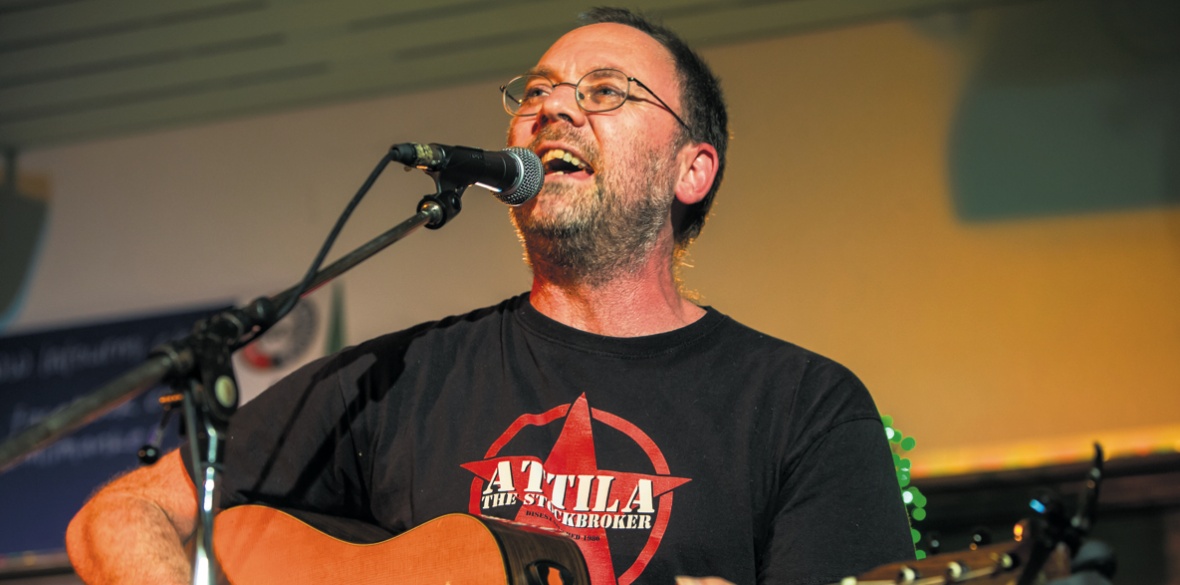This is the last article you can read this month
You can read more article this month
You can read more articles this month
Sorry your limit is up for this month
Reset on:
Please help support the Morning Star by subscribing here
You've called your new show the Musical History tour and it will focus on stories from the past. How can music shape our historical understanding and why is it important?
The powers-that-be in the US would have us believe that history is shaped mainly by great leaders or technological innovation.
What they don't want us to know is that history is mainly shaped by the many different forms that the struggle between the haves and have-nots takes at different points in different societies.
It's impossible to understand the world around us without understanding how we got here.
You’ve been gigging and touring since the 1990s. How have things changed for independent artists since then?
It's become far, far harder to survive as a musician. It's a similar situation for writers, film-makers and journalists. It's great that it's so easy to develop an international audience if you give away your music, books, movies or reportage but making a living is a whole different question.
I can't afford to tour in the US anymore and I tour in Europe for a living now, almost entirely, as far as gigs go. The lack of CD sales I've partially made up for with an online subscription scheme I call Community-Supported Art, which a lot of other artists are now doing.
For me it's working OK but I think I have a sort of advantage as a political artist in that way, strangely enough, which is not usually the case.
How has the changing digital landscape — the likes of Facebook, Twitter and Instagram — affected independent musicians?
The internet was a very useful place for about a decade, starting around 1995. Since the demise of email lists and Indymedia and the rise of Facebook, the dream is moribund, if not dead.
Facebook is a nightmare, unequivocally. If there were standard rules to social media and it all behaved more or less like Twitter it could be useful for a lot of people, like it used to be. Facebook has killed that and the regulatory authorities in most of the world have allowed that to happen, except in certain places, where it is quite sensibly just banned altogether.
You’ve written numerous songs about people who’ve resisted fascism, from rule-bending diplomats to armed partisans. What’s the best way right now for socialists to resist the rise of the far right?
The only way forward is for socialists to offer a clear alternative to fascism. It is neoliberals like Blair, Thatcher, Bush, Obama, Macron and Merkel who have pushed austerity budgets and free trade deals and imperialism. They have handed over their countries to people like Trump in the US, Le Pen in France and AfD in Germany.
Left parties in Europe and left electoral factions in Britain and the US are also growing – Die Linke, Melenchon, Corbyn and Sanders — but the fascists are growing faster, because they have become identified with local democracy, national sovereignty and economic protectionism.
These are all very popular ideas that socialists are widely seen as having abandoned in favour of identity politics.
As a frequent visitor to Britain, how do you feel the Corbyn project is turning out?
I find that the most hopeful place anywhere in Europe in the past couple years, strangely enough, is England — specifically England, not Wales or Scotland or anywhere else. Most of the people in England I know who used to do other political projects are now fully engaged with their local Labour Party branch.
To me, and to them, it seems hopeful. Everyone knows the stakes are huge on all sides and it's a big gamble and nothing is certain but I think it's a great effort and the atmosphere is refreshingly hopeful, from my vantage point.
Do you have any advice for radical musicians trying to build a following?
The first and most important piece of advice is write great songs, record them really well and perform them really well in public settings.
Figure out whether they're great songs objectively, not by asking your friends what they think. If your song is sad it should make people cry. If no-one is crying, it's not a sad song.
There is no room for an out-of-place word or phrase in a song. It's a ruthless medium. Imperfection will not be tolerated by anyone, whether they know it or not. It's like figure-skating — you can't fall down, you get a 0 that way, spell broken, in the toilet.
Tell a story that makes people forget where they are and who they are. Then tell another. Never tell anyone what you think or what you feel in a song. Let the story do that. If you're really, really good, you'll build a crowd by giving away your music.
Then it's a question of what you do with that.
David Rovics is performing at Housmans bookshop in London on Friday October 5 at 7pm, tickets: tiny.cc/davidrovicshousmans. Full details of the his Musical History tour are available at davidrovics.com











